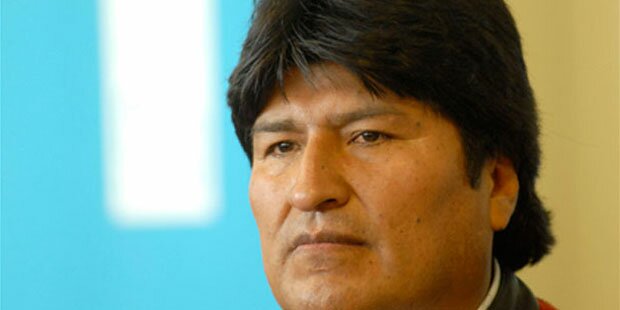They all yield to it in the end, it seems: powerful presidents see their time in office coming to a close, and they think, why not change the constitution and have another four years or five? Bolivia’s Evo Morales-leftist, popular, probably the country’s most important leader in living memory-decided this year that 15 years was not enough. He tried to amend the constitution so he could stay in power after his current term ends in 2020; but this week voters rejected the amendment. Perhaps they were wary of the country’s democratic institutions, but as Edmundo Paz Soldan points out here, the latest campaign showed Morales and his MAS party in a less sympathetic light.
On the night of February 23, just after learning that Evo Morales had lost the referendum in Bolivia to decide whether he could run for president again in 2020, former president Carlos Mesa immediately fired off two Tweets: “The victory of the ‘no’ vote portrays the conscience of a country that knows that respect for the Constitution will limit the absolute power of governments”, and “Mr. President, the Bolivian people’s vote has told us that there are no essential people, just essential causes”.
Mesa’s Tweets should be understood as part of the larger collateral damage that (Morales’) MAS party and the country have to face after they yielded, in the flush of his resounding victory in the 2014 elections, to the temptation to let Evo stay in power. The split between Evo and Mesa is no longer a secret: The former president was not invited to the last meeting of the group in charge of the tribunal in The Hague against Chile for access to ocean ports. It is significant: Mesa is (was?) the spokesman for the maritime dispute — the most lucid speaker and most historically knowledgeable person on the issue that the country could have had.
The main collateral damage is self-inflicted: The big loser is Evo, and not just because he did not get what he wanted, but also because the campaign showed the worst elements of his character, and brought to light other negative characteristics that we did not know about. When, three weeks before the referendum, a journalist dropped the bomb that Evo had a had a child with a woman (Gabriela Zapata) who was now the main lobbyist for a Chinese consortium that received millions in concessions from the government — with indications of nefarious insider influence —, his image as an incorruptible president was suddenly dashed (Embezzlement in the Indigenous Fund had shown corruption within his government, but Evo had managed to stay out it.)
The Zapata case has had the Bolivian people watching, seduced by its soap opera characteristics: a young lover turned quickly into a millionaire executive, despite having no professional career; a dead baby, whose name we hardly know today. The president had to come out and give explanations and clear up suspicions, but he fell prey to contradictions and lies that made the panorama even more strange. His extreme machismo led him to deny that he had a lover, despite photographic evidence, which, as activist Maria Galindo wrote, might have had an impact on the referendum vote: “His response to the allegations of insider influence, that he only knew Gabriela Zapata by her face, showed us a man for whom sexual and emotional relationships with woman have no value. Women are interchangeable and disposable. That is his machista response, one that caused society to reject him, (a rejection) that MAS cannot blame on the evil ‘right wing’, as they have done tirelessly.”
The campaign has also damaged the credibility of Vice President (Alvaro) Garcia Linera (the idea-man of Morales’ government who lied when he said he had undergraduate and graduate degrees from a Mexican university), and the credibility of the government’s team, arrogant and haughty at the worst of times: Four days before the referendum, a fire at the mayor’s office in El Alto (a city run by Evo’s political opponents), caused by people allied with MAS, ended with six dead. But there were ministers and vice ministers who, instead of projecting a sensitive, empathetic image, were cruel and hostile, even suggesting the blaze had been an “inside job”. The government seems incapable of seeing that there has been a change in the country. People expect their public officials to be transparent and accountable, but up until now no one has been fired for their mistakes.
The damage has also affected the image the country had of itself thanks to the “process of change” and the work the MAS party has done to increase inclusion of marginalized sectors of society. The vote has again revealed a profound division between the city and the country. If anyone thought that racism and classicism had finally been buried in our public discourse, a good part of the urban middle class, those who voted ‘no’ on the referendum, again showed their scorn for the indigenous government via memes and jokes on social media that ranged from clever to crude; they did the same thing with Gabriela Zapata, making fun of her for being a carpetbagger who rose up on the strength of sexual favors.
And that is where things are. It seems that everything that has to do with the referendum is negative. However, we are moving forward. Despite the campaign’s excesses, we exercised democracy. The ruling party has respected an outcome that is unfavorable for them. People are again politically engaged, most of all young people. We know each other better. The campaign’s revelations allow us to not idealize ourselves and to see how long the road is to achieving real change.
Edmundo Paz Soldan Translated from Spanish by Brian Hagenbuch for International Boulevard
01 Mar 2016




































